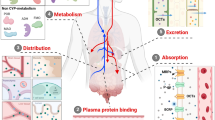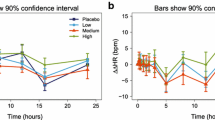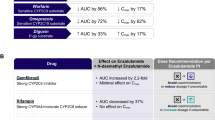Abstract
Celecoxib is a non-steroidal anti-inflammatory drug (NSAID) and a representative selective cyclooxygenase (COX)-2 inhibitor, which is commonly prescribed for osteoarthritis, rheumatoid arthritis, ankylosing spondylitis, acute pain, and primary dysmenorrhea. It is mainly metabolized by CYP2C9 and partly by CYP3A4 after oral administration. Many studies reported that CYP2C9 genetic polymorphism has significant effects on the pharmacokinetics of celecoxib and the occurrence of adverse drug reactions. The aim of this study was to develop a physiologically based pharmacokinetic (PBPK) model of celecoxib according to CYP2C9 genetic polymorphism for personalized pharmacotherapy. Initially, a clinical pharmacokinetic study was conducted where a single dose (200 mg) of celecoxib was administered to 39 healthy Korean subjects with CYP2C9*1/*1 or CYP2C9*1/*3 genotypes to obtain data for PBPK development. Based on the conducted pharmacokinetic study and a previous pharmacokinetic study involving subjects with CYP2C9*1/*13 and CYP2C9*3/*3 genotype, PBPK model for celecoxib was developed. A PBPK model for CYP2C9*1/*1 genotype group was developed and then scaled to other genotype groups (CYP2C9*1/*3, CYP2C9*1/*13 and CYP2C9*3/*3). After model development, model validation was performed with comparison of five pharmacokinetic studies. As a result, the developed PBPK model of celecoxib successfully described the pharmacokinetics of each CYP2C9 genotype group and its predicted values were within the acceptance criterion. Additionally, all the predicted values were within two-fold error range in comparison to the previous pharmacokinetic studies. This study demonstrates the possibility of determining the appropriate dosage of celecoxib for each individual through the PBPK modeling with CYP2C9 genomic information. This approach could contribute to the reduction of adverse drug reactions of celecoxib and enable precision medicine.




Similar content being viewed by others
References
Abduljalil K, Cain T, Humphries H, Rostami-Hodjegan A (2014) Deciding on success criteria for predictability of pharmacokinetic parameters from in vitro studies: an analysis based on in vivo observations. Drug Metab Dispos 42(9):1478–1484. https://doi.org/10.1124/dmd.114.058099
Bae JW, Kim HK, Kim JH, Yang SI, Kim MJ, Jang CG, Lee SY (2005) Allele and genotype frequencies of CYP2C9 in a Korean population. Br J Clin Pharmacol 60(4):418–422. https://doi.org/10.1111/j.1365-2125
Bae JW, Oh KY, Yoon SJ, Shin HB, Jung EH, Cho CK, Lim CW, Kang P, Choi CI, Jang CG, Lee SY, Lee YJ (2020) Effects of CYP2D6 genetic polymorphism on the pharmacokinetics of metoclopramide. Arch Pharm Res 43(11):1207–1213. https://doi.org/10.1007/s12272-020-01293-4
Baek NH, Song YG, Choi MS, Seo KS, Woo JY, Sohn JH (2015) Republic of Korea Patent No. 10–2015–0049649. http://kpat.kipris.or.kr/kpat/biblioa.do?method=biblioFrame. Accessed 10 June 2021
Brenner SS, Herrlinger C, Dilger K, Murdter TE, Hofmann U, Marx C, Klotz U (2003) Influence of age and cytochrome P450 2C9 genotype on the steady-state disposition of diclofenac and celecoxib. Clin Pharmacokinet 42(3):283–292. https://doi.org/10.2165/00003088-200342030-00003
Byeon JY, Lee CM, Lee YJ, Kim YH, Kim SH, Jung EH, Chae WK, Lee YJ, Jang CG, Lee SY (2019) Influence of CYP2D6 genetic polymorphism on pharmacokinetics of active moiety of tolterodine. Arch Pharm Res 42(2):182–190. https://doi.org/10.1007/s12272-018-1099-y
Caldwell B, Aldington S, Weatherall M, Shirtcliffe P, Beasley R (2006) Risk of cardiovascular events and celecoxib: a systematic review and meta-analysis. J R Soc Med 99(3):132–140. https://doi.org/10.1258/jrsm.99.3.132
Choi CI, Kim MJ, Jang CG, Park YS, Bae JW, Lee SY (2011) Effects of the CYP2C9*1/*13 genotype on the pharmacokinetics of lornoxicam. Basic Clin Pharmacol Toxicol 109(6):476–480. https://doi.org/10.1111/j.1742-7843.2011.00751.x
Dai DP, Xu RA, Hu LM, Wang SH, Geng PW, Yang JF, Cai JP (2014) CYP2C9 polymorphism analysis in Han Chinese populations: building the largest allele frequency database. Pharmacogenomics J 14(1):85–92. https://doi.org/10.1038/tpj.2013.2
Daly AK, Rettie AE, Fowler DM, Miners JO (2017) Pharmacogenomics of CYP2C9: functional and clinical considerations. J Pers Med 8(1):1. https://doi.org/10.3390/jpm8010001
Davies NM, McLachlan AJ, Day RO, Williams KM (2000) Clinical pharmacokinetics and pharmacodynamics of celecoxib: a selective cyclo-oxygenase-2 inhibitor. Clin Pharmacokinet 38(3):225–242. https://doi.org/10.2165/00003088-200038030-00003
Ding Y, Yang D, Zhou L, He P, Yao J, **e P, ** T (2015) Cytochrome P450 2C9 (CYP2C9) polymorphisms in Chinese Li population. Int J Clin Exp Med 8(11):21024–21033
Djebli N, Fabre D, Boulenc X, Fabre G, Sultan E, Hurbin F (2015) Physiologically based pharmacokinetic modeling for sequential metabolism: effect of CYP2C19 genetic polymorphism on clopidogrel and clopidogrel active metabolite pharmacokinetics. Drug Metab Dispos 43(4):510–522. https://doi.org/10.1124/dmd.114.062596
Duan P, Zhao P, Zhang L (2017) Physiologically based pharmacokinetic (PBPK) modeling of pitavastatin and atorvastatin to predict drug-drug interactions (DDIs). Eur J Drug Metab Pharmacokinet 42(4):689–705. https://doi.org/10.1007/s13318-016-0383-9
Emoto C, Fukuda T, Venkatasubramanian R, Vinks AA (2015) The impact of CYP3A5*3 polymorphism on sirolimus pharmacokinetics: insights from predictions with a physiologically-based pharmacokinetic model. Br J Clin Pharmacol 80(6):1438–1446. https://doi.org/10.1111/bcp.12743
Futatsugi A, Toshimoto K, Yoshikado T, Sugiyama Y, Kato Y (2018) Evaluation of alteration in hepatic and intestinal BCRP function in vivo due to ABCG2 c.421C>A polymorphism based on PBPK analysis of rosuvastatin. Drug Metab Dispos 46(5):749–757. https://doi.org/10.1124/dmd.117.078816
Goldstein JL, Correa P, Zhao WW, Burr AM, Hubbard RC, Verburg KM, Geis GS (2001) Reduced incidence of gastroduodenal ulcers with celecoxib, a novel cyclooxygenase-2 inhibitor, compared to naproxen in patients with arthritis. Am J Gastroenterol 96(4):1019–1027. https://doi.org/10.1111/j.1572-0241.2001.03740.x
Gong J, Iacono L, Iyer RA, Humphreys WG, Zheng M (2018) Physiologically based pharmacokinetic modeling of a CYP2C19 substrate, BMS-823778, utilizing pharmacogenetic data. Br J Clin Pharmacol 84(6):1335–1345. https://doi.org/10.1111/bcp.13565
Guo J, Zhou D, Li Y, Khanh BH (2015) Physiologically based pharmacokinetic modeling to predict complex drug-drug interactions: a case study of AZD2327 and its metabolite, competitive and time-dependent CYP3A inhibitors. Biopharm Drug Dispos 36(8):507–519. https://doi.org/10.1002/bdd.1962
Gupta A, Zheng L, Ramanujam V, Gallagher J (2015) Novel use of pharmacogenetic testing in the identification of CYP2C9 polymorphisms related to NSAID-induced gastropathy. Pain Med 16(5):866–869. https://doi.org/10.1111/pme.12654
Jones HM, Chen Y, Gibson C, Heimbach T, Parrott N, Peters SA, Hall SD (2015) Physiologically based pharmacokinetic modeling in drug discovery and development: a pharmaceutical industry perspective. Clin Pharmacol Ther 97(3):247–262. https://doi.org/10.1002/cpt.37
Jones HM, Dickins M, Youdim K, Gosset JR, Attkins NJ, Hay TL, Gardner IB (2012) Application of PBPK modeling in drug discovery and development at Pfizer. Xenobiotica 42(1):94–106. https://doi.org/10.3109/00498254.2011.627477
Jung EH, Lee YJ, Kim DH, Kang P, Lim CW, Cho CK, Jang CG, Lee SY, Bae JW (2020) Effects of paroxetine on the pharmacokinetics of atomoxetine and its metabolites in different CYP2D6 genotypes. Arch Pharm Res 43(12):1356–1363. https://doi.org/10.1007/s12272-020-01300-8
Jung EH, Lee CM, Byeon JY, Shin HB, Oh KY, Cho CK, Lim CW, Jang CG, Lee SY, Lee YJ (2002) Relationship between plasma exposure of zolpidem and CYP2D6 genotype in healthy Korean subjects. Arch Pharm Res 43(9):976–981. https://doi.org/10.1007/s12272-020-01250-1
Kim SH, Kim DH, Byeon JY, Kim YH, Kim DH, Lim HJ, Lee SY (2017) Effects of CYP2C9 genetic polymorphisms on the pharmacokinetics of celecoxib and its carboxylic acid metabolite. Arch Pharm Res 40(3):382–390. https://doi.org/10.1007/s12272-016-0861-2
Kim S-H, Byeon J-Y, Kim Y-H, Lee C-M, Lee Y-J, Jang C-G, Lee S-Y (2018) Physiologically based pharmacokinetic modelling of atomoxetine with regard to CYP2D6 genotypes. Sci Rep 8(1). https://doi.org/10.1038/s41598-018-30841-8
Kimura M, Ieiri I, Mamiya K, Urae A, Higuchi S (1998) Genetic polymorphism of cytochrome P450s, CYP2C19, and CYP2C9 in a Japanese population. Ther Drug Monit 20(3):243–247. https://doi.org/10.1097/00007691-199806000-00001
Kirchheiner J, Stormer E, Meisel C, Steinbach N, Roots I, Brockmoller J (2003) Influence of CYP2C9 genetic polymorphisms on pharmacokinetics of celecoxib and its metabolites. Pharmacogenetics 13(8):473–480. https://doi.org/10.1097/00008571-200308000-00005
Krasniqi V, Dimovski A, Domjanovic IK, Bilic I, Bozina N (2016) How polymorphisms of the cytochrome P450 genes affect ibuprofen and diclofenac metabolism and toxicity. Arh Hig Rada Toksikol 67(1):1–8. https://doi.org/10.1515/aiht-2016-67-2754
Kuepfer L, Niederalt C, Wendl T, Schlender JF, Willmann S, Lippert J, Teutonico D (2016) Applied concepts in PBPK modeling: how to build a PBPK/PD model. CPT Pharmacometrics Syst Pharmacol 5(10):516–531. https://doi.org/10.1002/psp4.12134
LC Laboratories Inc. (2018) Certificate of analysis, celecoxib [Online] Available from: https://www.lclabs.com/products/lots-certificate-of-analysis/celecoxib-CXB-104.pdf. Accessed 15 June, 2021
Lee CM, Jung EH, Byeon JY, Kim SH, Jang CG, Lee YJ, Lee SY (2019) Effects of steady-state clarithromycin on the pharmacokinetics of zolpidem in healthy subjects. Arch Pharm Res 42(12):1101–1106. https://doi.org/10.1007/s12272-019-01201-5
Lee CR, Goldstein JA, Pieper JA (2002) Cytochrome P4502C9 polymorphisms: a comprehensive review of the in-vitro and human data. Pharmacogenetics 12(3):251–263. https://doi.org/10.1097/00008571-200204000-00010
Lee HI, Bae JW, Choi CI, Lee YJ, Byeon JY, Jang CG, Lee SY (2014) Strongly increased exposure of meloxicam in CYP2C9*3/*3 individuals. Pharmacogenet Genomics 24(2):113–117. https://doi.org/10.1097/FPC.0000000000000025
Liu R, Gong C, Tao L, Yang W, Zheng X, Ma P, Ding L (2015) Influence of genetic polymorphisms on the pharmacokinetics of celecoxib and its two main metabolites in healthy Chinese subjects. Eur J Pharm Sci 79:13–19. https://doi.org/10.1016/j.ejps.2015.09.005
Lundblad MS, Ohlsson S, Johansson P, Lafolie P, Eliasson E (2006) Accumulation of celecoxib with a 7-fold higher drug exposure in individuals homozygous for CYP2C9*3. Clin Pharmacol Ther 79:287–288. https://doi.org/10.1016/j.clpt.2005.11.007
Mohammed S, Croom DW (1999) Gastropathy due to celecoxib, a cyclooxygenase-2 inhibitor. N Engl J Med 340(25):2005–2006. https://doi.org/10.1056/NEJM199906243402516
Moore RA, Derry S, Makinson GT, McQuay HJ (2005) Tolerability and adverse events in clinical trials of celecoxib in osteoarthritis and rheumatoid arthritis: systematic review and meta-analysis of information from company clinical trial reports. Arthritis Res Ther 7(3):R644-665. https://doi.org/10.1186/ar1704
Nishimura M, Naito S (2005) Tissue-specific mRNA expression profiles of human ATP-binding cassette and solute carrier transporter superfamilies. Drug Metab Pharmacokinet 20(6):452–477. https://doi.org/10.2133/dmpk.20.452
Nishimura M, Naito S (2006) Tissue-specific mRNA expression profiles of human phase I metabolizing enzymes except for cytochrome P450 and phase II metabolizing enzymes. Drug Metab Pharmacokinet 21(5):357–374. https://doi.org/10.2133/dmpk.21.357
Nishimura M, Yaguti H, Yoshitsugu H, Naito S, Satoh T (2003) Tissue distribution of mRNA expression of human cytochrome P450 isoforms assessed by high-sensitivity real-time reverse transcription PCR. Yakugaku Zasshi 123(5):369–375. https://doi.org/10.1248/yakushi.123.369
Park MH, Shin SH, Byeon JJ, Lee GH, Yu BY, Shin YG (2017) Prediction of pharmacokinetics and drug-drug interaction potential using physiologically based pharmacokinetic (PBPK) modeling approach: A case study of caffeine and ciprofloxacin. Korean J Physiol Pharmacol 21(1):107–115. https://doi.org/10.4196/kjpp.2017.21.1.107
Park SI, Park JY, Park MJ, Yim SV, Kim BH (2018) Effects of Ojeok-san on the pharmacokinetics of celecoxib at steady-state in healthy volunteers. Basic Clin Pharmacol Toxicol 123(1):51–57. https://doi.org/10.1111/bcpt.12971
Paulson SK, Hribar JD, Liu NW, Hajdu E, Bible RH Jr, Piergies A, Karim A (2000) Metabolism and excretion of [(14)C]celecoxib in healthy male volunteers. Drug Metab Dispos 28(3):308–314
Paulson SK, Kaprak TA, Gresk CJ, Fast DM, Baratta MT, Burton EG, Karim A (1999) Plasma protein binding of celecoxib in mice, rat, rabbit, dog and human. Biopharm Drug Dispos 20(6):293–299. https://doi.org/10.1002/(sici)1099-081x(199909)20:6%3c293::aid-bdd188%3e3.0.co;2-x
Pfizer Inc. (2016) U.S Prescribing information. [Online] Available from https://www.accessdata.fda.gov/drugsatfda_docs/label/2016/020998s048lbl.pdf. Accessed 30 June 2021
Poulin P, Schoenlein K, Theil FP (2001) Prediction of adipose tissue: plasma partition coefficients for structurally unrelated drugs. J Pharm Sci 90(4):436–447. https://doi.org/10.1002/1520-6017(200104)90:4%3c436::aid-jps1002%3e3.0.co;2-p
Poulin P, Theil FP (2000) A priori prediction of tissue:plasma partition coefficients of drugs to facilitate the use of physiologically-based pharmacokinetic models in drug discovery. J Pharm Sci 89(1):16–35. https://doi.org/10.1002/(SICI)1520-6017(200001)89:1%3c16::AID-JPS3%3e3.0.CO;2-E
Prieto-Perez R, Ochoa D, Cabaleiro T, Roman M, Sanchez-Rojas SD, Talegon M, Abad-Santos F (2013) Evaluation of the relationship between polymorphisms in CYP2C8 and CYP2C9 and the pharmacokinetics of celecoxib. J Clin Pharmacol 53(12):1261–1267. https://doi.org/10.1002/jcph.169
Rasool MF, Khalil F, Laer S (2017) Optimizing the Clinical Use of Carvedilol in Liver Cirrhosis Using a Physiologically Based Pharmacokinetic Modeling Approach. Eur J Drug Metab Pharmacokinet 42(3):383–396. https://doi.org/10.1007/s13318-016-0353-2
Rettie AE, Jones JP (2005) Clinical and toxicological relevance of CYP2C9: drug-drug interactions and pharmacogenetics. Annu Rev Pharmacol Toxicol 45:477–494. https://doi.org/10.1146/annurev.pharmtox.45.120403.095821
Sandberg M, Yasar U, Stromberg P, Hoog JO, Eliasson E (2002) Oxidation of celecoxib by polymorphic cytochrome P450 2C9 and alcohol dehydrogenase. Br J Clin Pharmacol 54(4):423–429. https://doi.org/10.1046/j.1365-2125.2002.01660.x
Shin HB, Jung EH, Kang P, Lim CW, Oh KY, Cho CK, Lee YJ, Choi CI, Jang CG, Lee SY, Bae JW (2020) ABCB1 c2677G>T/c3435C>T diplotype increases the early-phase oral absorption of losartan. Arch Pharm Res 43(11):1187–1196. https://doi.org/10.1007/s12272-020-01294-3
Shu Y, Cheng ZN, Liu ZQ, Wang LS, Zhu B, Huang SL, Zhou HH (2001) Interindividual variations in levels and activities of cytochrome P-450 in liver microsomes of Chinese subjects. Acta Pharmacol Sin 22(3):283–288
Stempak D, Bukaveckas BL, Linder M, Koren G, Baruchel S (2005) Cytochrome P450 2C9 genotype: impact on celecoxib safety and pharmacokinetics in a pediatric patient. Clin Pharmacol Ther 78(3):309–310. https://doi.org/10.1016/j.clpt.2005.06.005
Tang C, Shou M, Rushmore TH, Mei Q, Sandhu P, Woolf EJ, Rodrigues AD (2001) In-vitro metabolism of celecoxib, a cyclooxygenase-2 inhibitor, by allelic variant forms of human liver microsomal cytochrome P450 2C9: correlation with CYP2C9 genotype and in-vivo pharmacokinetics. Pharmacogenetics 11(3):223–235. https://doi.org/10.1097/00008571-200104000-00006
Thelen K, Coboeken K, Willmann S, Burghaus R, Dressman JB, Lippert J (2011) Evolution of a detailed physiological model to simulate the gastrointestinal transit and absorption process in humans, part 1: oral solutions. J Pharm Sci 100(12):5324–5345. https://doi.org/10.1002/jps.22726
Thelen K, Coboeken K, Willmann S, Dressman JB, Lippert J (2012) Evolution of a detailed physiological model to simulate the gastrointestinal transit and absorption process in humans, part II: extension to describe performance of solid dosage forms. J Pharm Sci 101(3):1267–1280. https://doi.org/10.1002/jps.22825
Vianna-Jorge R, Perini JA, Rondinelli E, Suarez-Kurtz G (2004) CYP2C9 genotypes and the pharmacokinetics of tenoxicam in Brazilians. Clin Pharmacol Ther 76(1):18–26. https://doi.org/10.1016/j.clpt.2004.03.002
Vieira MD, Kim MJ, Apparaju S, Sinha V, Zineh I, Huang SM, Zhao P (2014) PBPK model describes the effects of comedication and genetic polymorphism on systemic exposure of drugs that undergo multiple clearance pathways. Clin Pharmacol Ther 95(5):550–557. https://doi.org/10.1038/clpt.2014.43
Yeo KR, Kenny JR, Rostami-Hodjegan A (2013) Application of in vitro-in vivo extrapolation (IVIVE) and physiologically based pharmacokinetic (PBPK) modeling to investigate the impact of the CYP2C8 polymorphism on rosiglitazone exposure. Eur J Clin Pharmacol 69(6):1311–1320. https://doi.org/10.1007/s00228-012-1467-3
Zhang M, Yang Y, Zhao G, Di X, Xu L, Jiang N, Xu X (2014) Effect of CYP2C9*3 mutant variants on meloxicam pharmacokinetics in a healthy Chinese population. Genet Mol Res 13(1):831–837. https://doi.org/10.4238/2014
Zhuang X, Lu C (2016) PBPK modeling and simulation in drug research and development. Acta Pharm Sin B 6(5):430–440. https://doi.org/10.1016/j.apsb.2016.04.004
Acknowledgements
This research was supported the Basic Science Research Program through the National Research Foundation of Korea (NRF) funded by the Ministry of Science, ICT, & Future Planning (NRF-2019R1A2C1004582).
Author information
Authors and Affiliations
Corresponding author
Ethics declarations
Conflict of interest
The authors declare that they have no conflict of interest.
Additional information
Publisher's Note
Springer Nature remains neutral with regard to jurisdictional claims in published maps and institutional affiliations.
Rights and permissions
About this article
Cite this article
Kim, YH., Kang, P., Cho, C. et al. Physiologically based pharmacokinetic (PBPK) modeling for prediction of celecoxib pharmacokinetics according to CYP2C9 genetic polymorphism. Arch. Pharm. Res. 44, 713–724 (2021). https://doi.org/10.1007/s12272-021-01346-2
Received:
Accepted:
Published:
Issue Date:
DOI: https://doi.org/10.1007/s12272-021-01346-2




